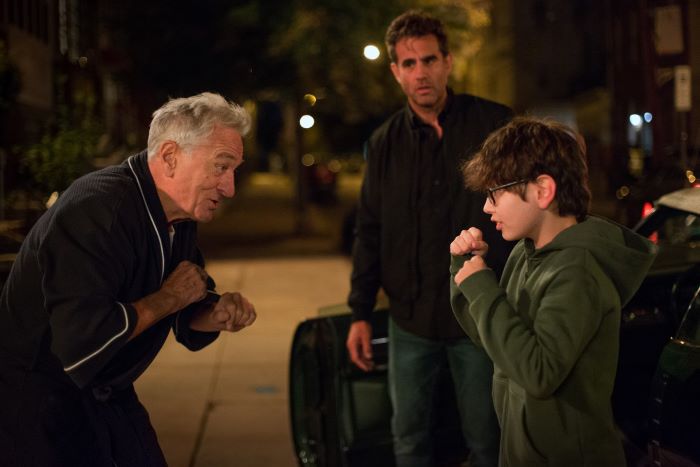Ezra is a slickly made, somewhat manipulative tearjerker that manages through unassuming craft, great performances, and good old heart and moxie to overcome any deficiencies and deliver an emotional and enjoyable experience.
Bobby Cannavale is Max, a stand-up comedian and father of Ezra (William A. Fitzgerald), a precocious 11-year-oldboy who has autism. He is co-parenting with his ex, Jenna (Rose Byrne). Both clearly love are accepting and protective of their son. But their parenting styles are different, as is their approach to dealing with Ezra’s autism. Bobby wants his son to confront the world as it is. Jenna feels that this is ignoring Ezra’s condition and that they have to meet Ezra halfway.
Meanwhile, Max lives with his dad, Stan (Robert De Niro), a former boxer and now doorman who, like Max, tends to have an impulse control issue when he feels attacked. Things come to a head when Ezra is expelled from his public school. Overhearing Rose’s boyfriend (played by the film’s director, Tony Goldwyn) joke about killing Max one evening, Ezra sneaks out to warn Max, and spooked by a dog, runs into the street and gets hit by a cab. Luckily, he is not seriously injured, but it is enough for him to be flagged as at risk. His attending physician meets with the parents and insists that Ezra is medicated and sent to a special school for neurodiverse children. This sets Max off to the point where he attacks the physician, which leads him to a night in jail and a restraining order against him. In grand Hollywood fashion though, Max decides to kidnap his son and take him on a road trip after seeing Max miserable in the recess yard of his new school.
Now that’s a lot of set up, but Goldwyn manages to tick through it smoothly and efficiently. To his credit, the movie never feels overstuffed. In fact, it gives plenty of space for the performers, and the audience, to breathe. It’s apparent that writer Tony Spiridakis’s goal is for Max and Ezra to fight, bond, and learn to understand each other. Luckily, Spiridakis, who himself is the father of a neurodiverse child, has a keen ear for dialogue and manages to keep his characters grounded and believable, regardless of the extraordinary circumstances portrayed.
Cannavale, a superb actor, is on fire here. He inhabits his character to an impressive degree and imbues Max with deep compassion, along with a strong dollop of deep-seated righteousness. Of course, the enterprise wouldn’t work if the actor playing Ezra didn’t bring the goods. In his first film, Fitzgerald, a young neurodiverse performer, easily holds his own among his more experienced co-stars. He has demonic comic timing. In fact, the biggest laughs come from his dry asides. Fitzgerald also handles the more dramatic elements with aplomb. Any young person who can easily hold his own against De Niro, Cannavale, and Byrne has a leg up.
Although Ezra does an excellent job at portraying neurodiverse characters, it still falls into typical Hollywood clichés: the aforementioned kidnapping, for example, and the third act, where Max extends their road trip for a shot at the comedic big time. Luckily, what it gets right is far more than the occasional plot misstep.
All in all, Ezra is a solid and entertaining movie that is absolutely worth checking out.







Leave A Comment